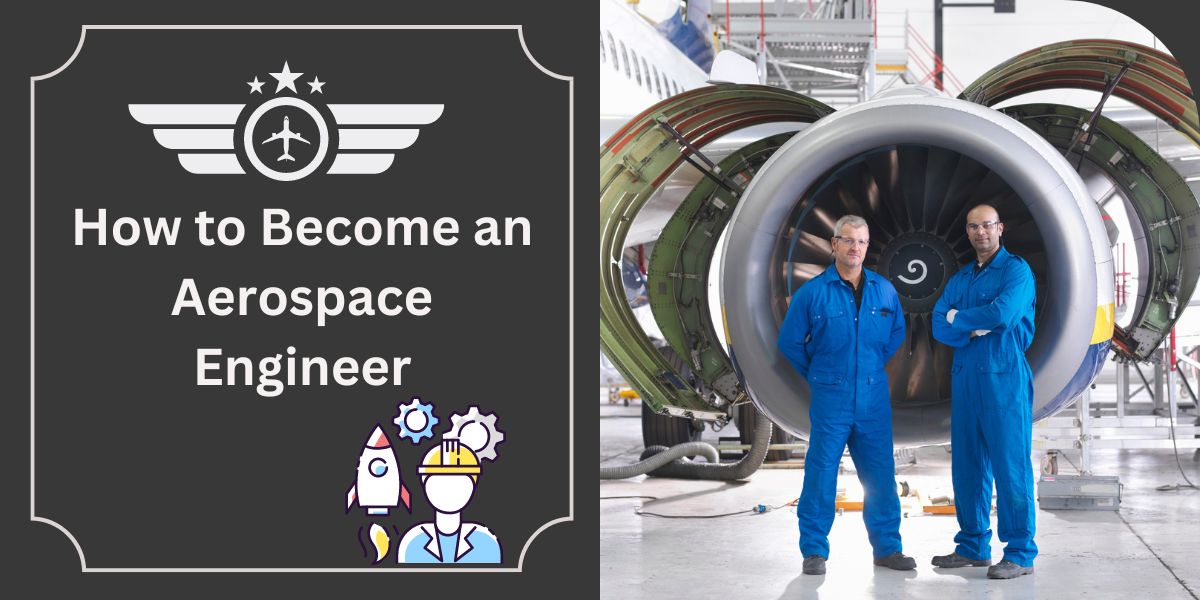Embarking on the journey to become an aerospace engineer opens doors to a world of innovation and discovery. This career in aviation blends science, technology, and creativity, offering endless opportunities to shape the future of flight.
If you have a passion for spacecraft or aircraft, in addition to strong math and physics skills, then a career as an aerospace engineer may be a great fit for you.
In this article, we will discuss what you need to know about aerospace engineering, how to become an aerospace engineer, what they do, their skills, salary, and job outlook.
What is aerospace engineering?
Aerospace engineering is the discipline of engineering dedicated to designing, testing, and manufacturing aircraft, spacecraft, satellites, missiles, and related equipment and systems. The discipline is generally split into three distinct areas: aeronautical engineering, astronautical engineering, and avionics.
Aeronautical engineering (or aeronautics) pertains to air flight within Earth’s atmosphere. This includes airplanes, helicopters, unmanned aerial systems (or drones), hot air balloons, blimps, ballistic vehicles, and any other atmospheric aircraft or airships.
Astronautical engineering (sometimes called astronautics or rocket science) pertains to space flight beyond Earth’s atmosphere into outer space. This includes spaceships, satellites, launch vehicles, probes, and any other orbital or suborbital spacecraft.
Avionics pertains to the electronic systems used in air and space flight applications, such as control systems, communications systems, navigation systems, display systems, and more.
What is an Aerospace Engineer?
An aerospace engineer is a qualified engineer who works within the aerospace or space sectors to design and test aircraft or spacecraft.
They maintain excellent quality control to ensure the safety of everyone who travels by air or in space. A job as an aerospace engineer is a highly responsible position that requires a high level of competence and technical skill.
Common job titles associated with the aerospace engineering field include:
- Aerospace Engineer
- Aeronautical Engineer
- Astronautical Engineer
- Avionics Engineer
- Aircraft Designer
- Spacecraft Designer
- Data Processing Manager
- Inspector and Compliance Officer
- Mission or Payload Specialist
- Flight Test Engineer
- Mechanical Engineer
- Electrical Engineer
- Materials Engineer
- Systems Engineer
What Does an Aerospace Engineer Do?
Aerospace engineers evaluate designs to see that the products meet engineering principles. They develop, and test aircraft, spacecraft, satellites, and missiles. In addition, they create and test prototypes to make sure that they function according to design.
An Aerospace engineer typically does the following:
- Coordinate and direct the design, manufacture, and testing of aircraft and aerospace products
- Assess project proposals to determine whether they are technically and financially feasible
- Determine whether proposed projects will be safe and meet defined goals
- Evaluate designs to ensure that products meet engineering principles, customer requirements, and environmental regulations
- Develop criteria for design, quality, completion, and sustainment after delivery
- Ensure that projects meet the required standards
- Inspect malfunctioning or damaged products to identify sources of problems and possible solutions
An Aerospace engineer develops technologies for use in aviation, defense systems, and spacecraft. They may focus on areas such as aerodynamic fluid flow; structural design; guidance, navigation, and control; instrumentation and communication; robotics; or propulsion and combustion.
Aerospace engineers may design specific aerospace products, such as commercial and military airplanes and helicopters; remotely piloted aircraft and rotorcraft; spacecraft, including launch vehicles and satellites; and military missiles and rockets.
How to Become an Aerospace Engineer
Since aerospace engineering is a technically demanding field, aerospace engineers need to be highly qualified. Here are the steps to enter this career:
1. Take advanced math and science classes in high school
Prepare for your future as an aerospace engineer by taking high-level math and science courses such as physics, trigonometry, calculus, computer programming, and chemistry. Earning high marks in these classes can help you improve your chances of admission to a degree program.
If you already finished high school and are looking for a career change, you may need to take adult education classes to ensure you have the right knowledge and skills to move into an appropriate degree program.
Your current employer may even offer sponsorship to help your career development. Try asking management or human resources to determine what’s available.
2. Choose suitable hobbies and extracurricular activities
Pursue hobbies and extracurricular activities that relate to the aerospace field. The right hobbies and interests help you develop good analytical and problem-solving skills and help you gain scientific knowledge and experience.
Consider strategy games, puzzle-solving, engineering projects, and computer programming. In addition, take any opportunities to attend engineering clubs or summer camps.
3. Earn a bachelor’s degree in aerospace engineering
Most employers require a bachelor’s degree in aerospace engineering. Pursue this four-year degree and earn it from a university that’s accredited by the Accreditation Board for Engineering and Technology (ABET).
For those already in employment, some universities offer part-time courses. If you already have extensive experience working in the sector, you may qualify to move into engineering with a lower level of qualifications. Discuss your options with your employer.
4. Choose a suitable minor
Select a relevant minor to enhance your employability. It’s also important to take extra classes as needed to improve your skills. Writing and business skills can improve your employability in a competitive field since you’re expected to write reports and understand business practices in this field.
5. Complete an internship or cooperative program
While not essential, an internship with an aerospace company is a valuable experience that can enhance your skills and your resume as an aerospace engineer. Consider completing an internship and starting to build a network of contacts within the aerospace industry.
Many degree programs partner with regional businesses to offer opportunities for work experience. For those already in employment, determine if you can shadow an engineer to gain a greater understanding of their job.
6. Earn a graduate degree in aerospace engineering
While you don’t need a graduate degree, consider earning this advanced degree to enhance your employability.
Some colleges offer a combined five-year bachelor’s and master’s degree programs. You may be able to move into a master’s program in aerospace engineering if you already have a bachelor’s degree in a related subject, such as physics.
7. Apply to entry-level positions and apprenticeships
Pursue entry-level positions and apprenticeships to strengthen your qualifications. Consider applying to the company where you did your internship or cooperative program. It’s also worth considering regional and national aerospace businesses and government agencies.
To work for a government agency such as NASA, you need U.S. citizenship or to qualify as a permanent resident. To work in defense, including on defense-related contracts within the private sector, you need a security clearance.
8. Work in a related job
If you cannot secure the engineering position you want right away, try working in a related job. Aerospace engineering is very demanding, so you may not earn employment immediately.
However, a related job, such as that of an avionics technician can help you build your experience and contacts in the industry. After a few years of valuable experience, you may qualify for an aerospace engineering position.
9. Join a professional organization
Consider joining a professional organization related to this field. Becoming a member of the American Institute of Aeronautics and Astronautics, for example, lets you take advantage of many opportunities for education and networking.
10. Earn your license
Although unnecessary for an entry-level position, earn a state license to advance in your career and become a professional engineer.
Exact requirements vary from state to state, but you typically need a degree from an ABET-accredited engineering program, a passing score on the Fundamentals of Engineering exam, and a passing score on the Professional Engineering exam. You will also need some relevant work experience. Typically, you need at least four years.
Skills to Become an Aerospace Engineer
Aerospace engineers require a variety of skills for their line of work. Here are some skills you need to succeed in this career:
- Numeracy: Numeracy skills refer to your ability to use mathematics to solve everyday problems. Aerospace engineers use this skill for their various duties, such as modeling shapes and designing on a computer. They also use it to troubleshoot their work.
- Analytical skills: Having analytical skills means you’re able to simplify information into smaller bits of information in order to draw various conclusions. Aerospace engineers use this skill to identify design elements that may not meet a project’s requirements and to find alternative solutions.
- Business skills: This refers to your ability to understand both consumer and organizational behavior and use this knowledge to promote a company’s success. Aerospace engineers use their business skills to help them meet federal government standards. In order to meet these standards, you need to know standard business practices and commercial law.
Aerospace Engineer Salary and Job Outlook
Aerospace engineers can work in either the public sector for government agencies such as NASA and the Department of Defense, or for private companies in the aerospace sector, such as airplane manufacturers.
According to the Bureau of Labor Statistics (BLS), aerospace engineers earn a median annual wage of $118,610 per year. The BLS also reports a stable job outlook for this career.
Employment of an aerospace engineer is projected to grow 6 percent from 2022 to 2032, faster than the average for all occupations.
About 3,800 openings for aerospace engineers are projected each year, on average, over the decade. Many of those openings are expected to result from the need to replace workers who transfer to different occupations or exit the labor force, such as to retire.
Conclusion
The path to becoming an aerospace engineer is filled with opportunities for growth, discovery, and innovation. By fostering a solid understanding of math and science, pursuing relevant education, and maintaining a steadfast commitment to learning, aspiring engineers can unlock the door to a fulfilling career in aerospace.
Aerospace engineers design aircraft, spacecraft, and propulsion systems. It is one of the most challenging fields of engineering and requires special academic qualifications and training. However, if you get the right education and gain experience in the field, you’ll have no problem establishing your career in aerospace engineering.




 Jobi.ng
Jobi.ng



